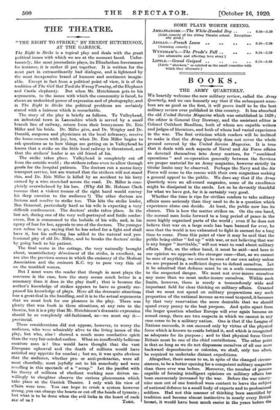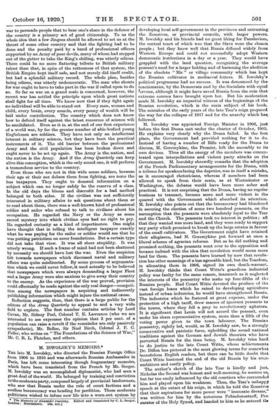BOOKS.
11,th. ARMY QUARTERLY.
WE heartily welcome the new military review, called the Army Quarterly, and we can honestly say that if the subsequent num- bers are as good as the first, it will prove itself to be the best military review ever published in this country. It has absorbed the old United Service Magazine which was established in 1829; the editor is General Guy Dawnay, and the assistant editor is Colonel Cuthbert Ileadlam, both of whom are capable writers and judges of literature, and both of whom had varied experience in the war. The first criticism which readers will be inclined to make is that the Army Quarterly does not cover the whole ground covered by the United Service Magazine. h is true that it deals with such aspects of Naval and Air Force affairs as dovetail themselves into Army matters, for "combined operations" and co-operation generally between the Services are proper material for an Army magazine, however strictly its titular limits may be observed. Perhaps the Navy and the Air Force will come to the rescue with their own magazines making a general appeal to the public. We dare say that if the Army Quarterly were an all-round magazine, some of its excellence might be dissipated in the sands. Let us be devoutly thankful for what we have got, for it is certainly very good.
Whether the time is ripe for civilian readers to take military affairs more seriously than they used to do is a question which experience alone can decide. At least, the public now has its chance. This is how the matter strikes us. On the one hand, the normal man looks forward to a long period of peace in the more highly organized parts of the world ; even if he does not believe that war on a large scale has balm banned for ever, ho sees that the world is too exhausted to fight in earnest for a long time to come. From this point of view it may be said that the public being either "fed up "with war, or not believing that war is any longer "inevitable," will not want to read about military affairs. But, on the other hand, it must be said—and here in our opinion we approach the stronger case—that, as we cannot be sure of anything, we cannot be sure of our own safety unless we are prepared in a sufficient degree to defend ourselves. Let it be admitted that defence must be on a scale commensurate to the suspected danger. We must not over-insure ourselves any more than we must under-insure ourselves. Within such limits, however, there is surely a tremendously wide and important field for clear thinking on military affairs. Granted that we must not spend on military preparations any such proportion of the national income saws used tospend, it becomes by that very reservation the more desirable that we should spend every penny to the best purpose. And quite apart from the larger question whether Europe will ever again become an armed camp, there are two respects in which we cannot in any case cease to be a military nation. One is that if the League of Nations succeeds, it can succeed only by virtue of the physical force which is known to reside behind it, and which is recognized as adequate for its purpose ; and to that physical force Great Britain must be one of the chief contributors. The other point is that so long as we do not dispossess ourselves of all our more backward dependencies or colonies, we shall, only too often, be required to undertake distant expeditions.
Altogether, there seems to us, in spite of the changed einenl. stances, to be a better opening for a competent military magazine' than there ever was before. Moreover, the number of persons capable of forming intelligent opinions on military affairs hes been enormously increased by the war. Before the war ninety- nine men out of one hundred were content to leave the subject of national defence to a small body of experts and to professional soldiers. Had not this manner of thinking been sanctified by tradition and become almost instinctive in nearly every British breast, it would have been much easier in the years before the
war to persuade people that to bear one's share in the defence of the country is a primary act of good citizenship. To us the whole idea that a few Jingoes should be allowed to set us at the throat of some other country and that the fighting had to be done and the penalty paid by a band of professional officers supported by an Army of poor devils, many of whom had stepped out of the gutter to take the King's shilling, was utterly odious. There could be no more flattering tribute to British military talent than that, in spite of the rottenness of that system, the British Empire kept itself safe, and not merely did itself credit, but had a splendid military record. The whole plan, besides being odious, was utterly undemocratic. The man who shouts for war ought to have to take part in the war if called upon to do so. So far as war on a grand scale is concerned, however, the recent war has settled the principle upon which great nations shall fight for all time. We know now that if they fight again no individual will be able to stand out Every man, woman and child, every brain, every muscle, every penny of wealth will be laid under contribution. The country which does not know how to defend itself against the latest resources of science will be annihilated. Even as it is, at the end of our first experience of a world war, by far the greater number of able-bodied young Englishmen are soldiers. They have not only an intellectual interest in military science, but they have been the practical instruments of it. The old barrier between the professional Army and the civil population has been broken down and ought never to be set up again. The Army is the nation, and the nation is the Army. And if the Army Quarterly can keep alive this conception, which is the only sound one, it will perform a tremendous service to the country.
Even those who are not in this wide sense soldiers, because their age or their sex debars them from fighting, are none the less taxpayers. They ought to demand information on a subject which can no longer safely be the reserve of a class. In the old days the blame and discredit for a bad method belonged to both sides. If the civilian was not sufficiently interested in military affairs to ask questions about them or to read about them, there was a well-known kind of professional soldier and sailor who refused to talk to civilians about his occupation. He regarded the Navy or the Army as some sacred mystery into which civilian eyes had no right to pry. He regarded curiosity as a kind of impertinence. One might have thought that in telling the intelligent taxpayer exactly what he was paying for the sailor or soldier would see that he was putting patriotism on surer foundations. But a certain type did not take that view. It was all sheer stupidity. It was utterly wrong. If such a frame of mind had not been shattered by necessity we should have lost the war. Even the suspicion felt towards newspapers which discussed naval and military affairs was quite misdirected. By some process of argumenta- tion which we could never follow, it used actually to be believed that newspapers which were always demanding a larger Fleet and a larger Army were also anxious to give away their country to the enemy. As the experience of the war proved, provision could effectually be made against the only real danger—competi. tion among the newspapers in acquiring and indiscreetly publishing information which might injure the national cause. Reflection suggests, then, that there is a large public for the editors of the Army Quarterly to appeal to and a very wide field to explore. The first number contains articles by Lord Cavan, Mr. Sidney Peel, Colonel T. E. Lawrence (who we are interested to see expresses the opinion that 2 per cent, of a population can raise a revolt if the remainder are only passively sympathetic)), Mr. Ram, Sir Noel Birch, Colonel J. F. C. Fuller, who writes on "The Foundations of the Science of War," Mr. C. R. L. Fletcher, and others.







































 Previous page
Previous page